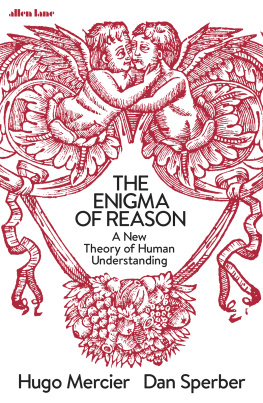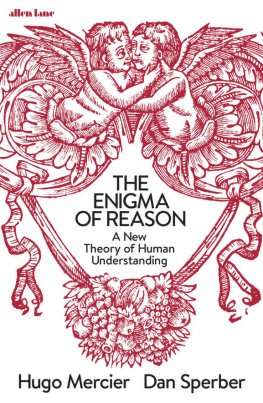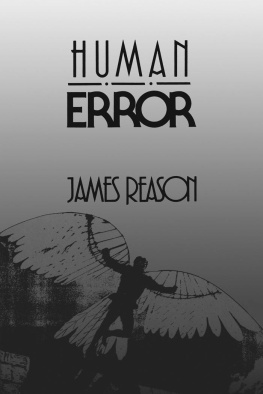Hugo Mercier and Dan Sperber
THE ENIGMA OF REASON
A New Theory of Human Understanding
ALLEN LANE
UK | USA | Canada | Ireland | Australia
India | New Zealand | South Africa
Allen Lane Books is part of the Penguin Random House group of companies whose addresses can be found at global.penguinrandomhouse.com.
First published in the United States of America by Harvard University Press 2017
First published in Great Britain by Allen Lane 2017
Copyright Hugo Mercier and Dan Sperber, 2017
The moral rights of the authors have been asserted
Cover image from the title page of Discourse on the method, Dioptrics, Meteors, and Geometry, by Ren Descartes (15961650), edition published in Paris, 1668.
Bridgeman Images.
Design: Jim Stoddart
ISBN: 978-1-846-14558-2
Introduction: A Double Enigma
They drink and piss, eat and shit. They sleep and snore. They sweat and shiver. They lust. They mate. Their births and deaths are messy affairs. Animals, humans are animals! Ah, but humans, and humans alone, are endowed with reason. Reason sets them apart, high above other creaturesor so Western philosophers have claimed.
The shame, the scandal of human animality, could at least be contained by invoking reason, the faculty that makes humans knowledgeable and wise. Reason rather than languageother animals seemed to have some form of language too. Reason rather than the soultoo mysterious. Endowed with reason, humans were still animals, but not beasts.
Reason: A Flawed Superpower?
With Darwin came the realization that whatever traits humans share as a species are not gifts of the gods but outcomes of biological evolution. Reason, being such a trait, must have evolved. And why not? Hasnt natural selection produced many wondrous mechanisms?
Take vision, for instance. Most animal species benefit from this amazing biological adaptation. Vision links dedicated external organs, the eyes, to specialized parts of the brain and manages to extract from patterns of retinal stimulation exquisitely precise information about the properties, location, and movement of distant objects. This is a hugely complex taskmuch more complex, by any account, than that of reason. Researchers in artificial intelligence have worked hard on modeling and implementing both vision and reasoning. Machine vision is still rudimentary; it comes nowhere near matching the performances of human vision. Many computer models of reasoning, on the other hand, have been claimed (somewhat optimistically) to perform even better than human reason. If vision could evolve, then why not reason?
We are told that reason, even more than vision, is a general-purpose faculty. Reason elevates cognition to new heights. Without reason, animal cognition is bound by instinct; knowledge and action are drastically limited. Enhanced with reason, cognition can secure better knowledge in all domains and adjust action to novel and ambitious goals, or so the standard story goes. But wait: If reason is such a superpower, why should it, unlike vision, have evolved in only a single species?
True, some outstanding adaptations are quite rare. Only a few species, such as bats, have well-developed echolocation systems. A bat emits ultrasounds that are echoed by surfaces in its environment. It uses these echoes to instantaneously identify and locate things such as obstacles or moving prey. Most other animals dont do anything of the sort.
Vision and echolocation have many features in common. One narrow range of radiationlight in the case of vision, ultrasounds in the case of echolocationprovides information relevant to a wide variety of cognitive and practical goals. Why, then, is vision so common and echolocation so rare? Because, in most environments, vision is much more effective. Echolocation is adaptive only in an ecological niche where vision is impossible or badly impairedfor instance, when dwelling in caves and hunting at night, as bats do.
Is reason rarearguably unique to a single speciesbecause it is adaptive in a very special kind of ecological niche that only humans inhabit? This intriguing possibility is well worth exploring. It is incompatible, however, with the standard approach to reason, which claims that reason enhances cognition whatever the environment it operates in and whatever the task it pursues. Understanding why only a few species have echolocation is easy. Understanding why only humans have reason is much more challenging.
Think of wheels. Animals dont have wheels. Why not? After all, wheeled vehicles are much easier to construct than ones with legs or wings (just as models of reasoning seem much easier to develop than models of vision). However, artificial wheels are made separately and then added onto a vehicle, whereas biological wheels would have to grow in situ. How could a freely rotating body part either be linked to the rest of the body through nerves and blood vessels or else function without being so linked? Viable biological solutions are not easy to conceive, and that is only part of the problem.
For a complex biological adaptation to have evolved, there must have been a series of evolutionary steps, from rudimentary precursors to fully developed mechanisms, where every modification in the series has been favored (or at least not eliminated) by natural selection. The complex visual systems of insects, mollusks, or mammals, for instance, have all evolved from mere light-sensitive cells through long series of modifications, each of which was adaptive or neutral. Presumably, a similar series of adaptive steps from nonwheeled to wheeled animals was, if not impossible, at least so improbable that it never occurred.
Perhaps, then, reason is to animal cognition what wheels are to animal locomotion: an extremely improbable evolutionary outcome. Perhaps reason is so rare because it had to evolve through a series of highly improbable steps and it did so only once, only very recently in evolutionary time, and for the benefit of just one lucky speciesus.
The series of steps through which reason would gradually have evolved remains a mystery. Reason seems to be hardly better integrated among the more ordinary cognitive capacities of humans than are the superpowers of Superman or Spider-Man among their otherwise ordinary human features. Of course, it could be argued that reason is a graft, an add-on, a cultural contraptioninvented, some have suggested, in ancient Greecerather than a biological adaptation. But how could a species without the superpower of reason have invented reason itself? While reason has obviously benefited from various cultural enhancements, the very ability of a species to produce, evaluate, and use reasons cries out for an evolutionary explanation. Alas, what we get by way of explanation is little more than hand waving.
The problem is even worse: the hand waving itself seems to point in a wrong direction. Imagine, by way of comparison, that, against the odds, biological wheels had evolved in one animal species. We would have no idea how this evolution had taken place. Still, if these wheels allowed the animals to move with remarkable efficiency in their natural environment, we would have a good idea why they had evolved; in other terms, we would understand their function. We might expect animal wheels, like all biological organs, to have weaknesses and to occasionally malfunction. What we would not expect, though, is to find some systematic flaw in this locomotion system that compromised the very performance of its functionfor instance, a regular difference in size between wheels on opposite sides, making it hard for the animals to stay on course. A biological mechanism described as an ill-adapted adaptation is more likely to be a misdescribed mechanism. Reason as standardly described is such a case.












